
Anton’s Musical Instrument Repair Interview
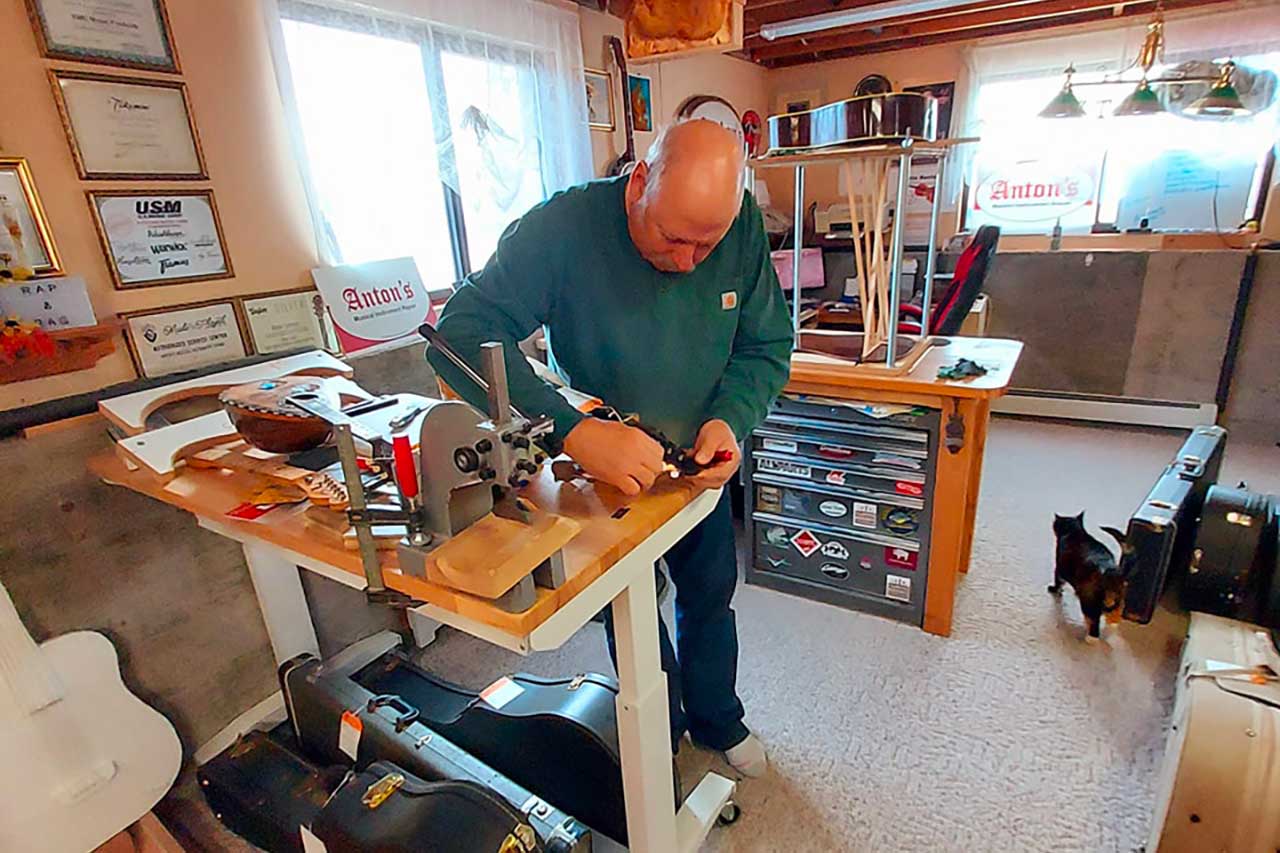
Anton’s Musical Instrument Repair Interview
For those who don’t know you yet, can you tell us about your background? Did you go to a luthier school? Did you train with established luthiers? And, if it’s not indiscreet, what did you do before starting this adventure? Were you a musician before becoming a luthier? Or were you doing something else? And, by the way, do you still find time to play music with your work as a luthier?
My woodworking experience comes from many years of cabinet and custom furniture making. I studied as an apprentice under Daniel Bell. He is a luthier, building mandolins and guitars.
After that I was influenced by meeting some repairmen, Charlie Derrington and Frank Ford.
I do still play, although have slowed down in the last five or six years.
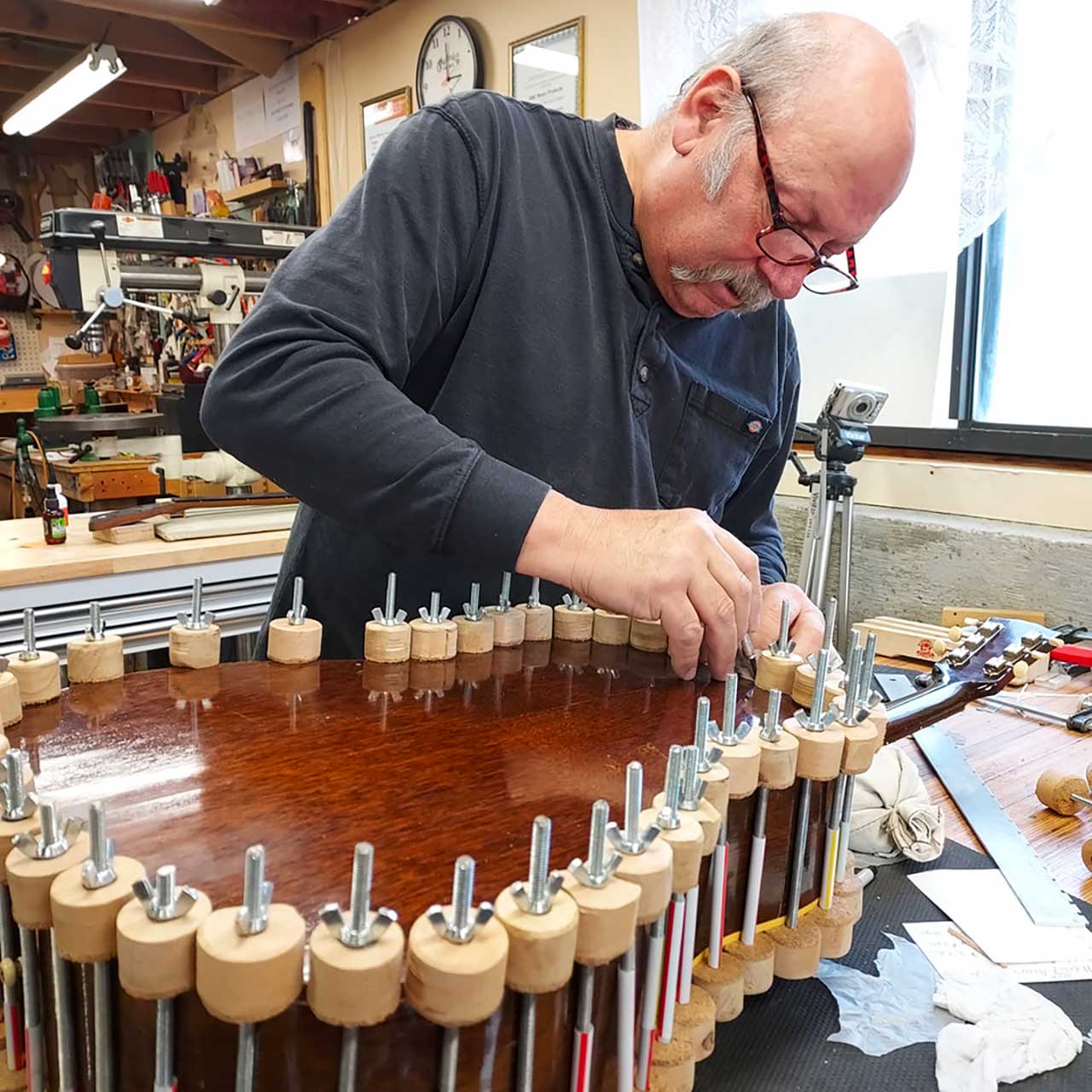
Apart from creating custom instruments, we know that you do all kinds of repairs and maintenance of guitars and basses, can you also take care of other types of plucked and bowed instruments?
I repair all stringed instruments with the exception of pianos. I’ve worked on banjos, mandolins, violins, lap steels, hurdy gurdies, you name it!
We’re not only a factory authorized guitar repair center for C.F. Martin, Fender, Taylor and many others; but also, an Oscar Smith autoharp authorized repair center.
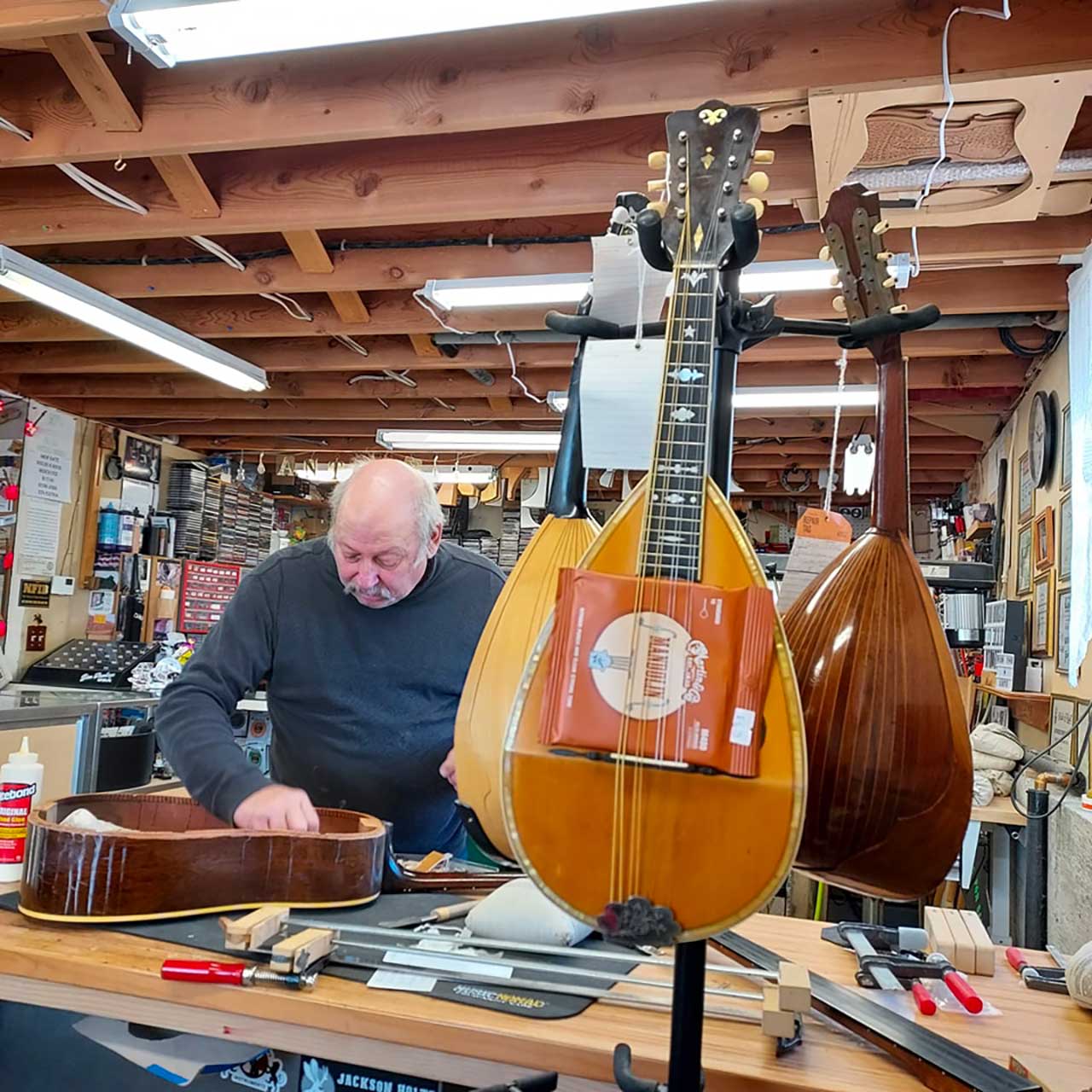
If you do repair and restoration of old instruments, can you tell us about this very specific process? Do you use specific traditional techniques? specific materials? different tools?
Though I do many old instrument repairs and restorations, I do not work from a museum restoration approach.
Most people want it together and playable to continue to pass on to future generations. We use modern approaches to repairing and try to keep within the client’s budget. I don’t repair significantly historic instruments, mostly good playable instruments.
I use a wide variety of tools from purchased to made to fit the particular repair.
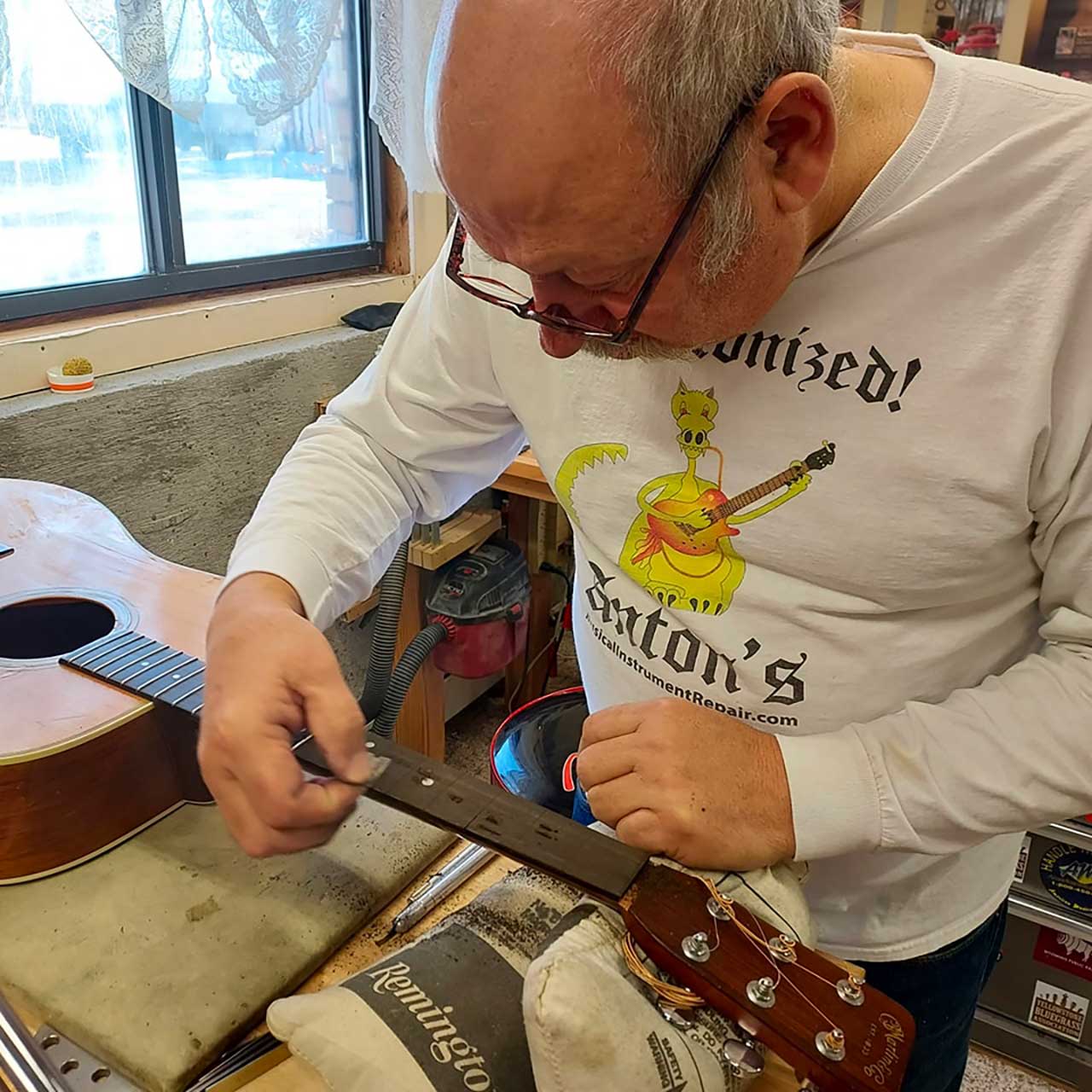
How are you inspired by these historical instruments in your creation process for your own instruments?
I am honored to work on fine historical instruments at times.
In my repairs, I want to remain true to my esteem of the historical value of an instrument. Sometimes I am limited to the customer’s pocketbook and their possible lack of understanding of its value. I give a consultation for the estimate for the repair and its value and at times they choose to cut a corner.
Most of the instruments I encounter are musician owned instruments, not museum pieces.
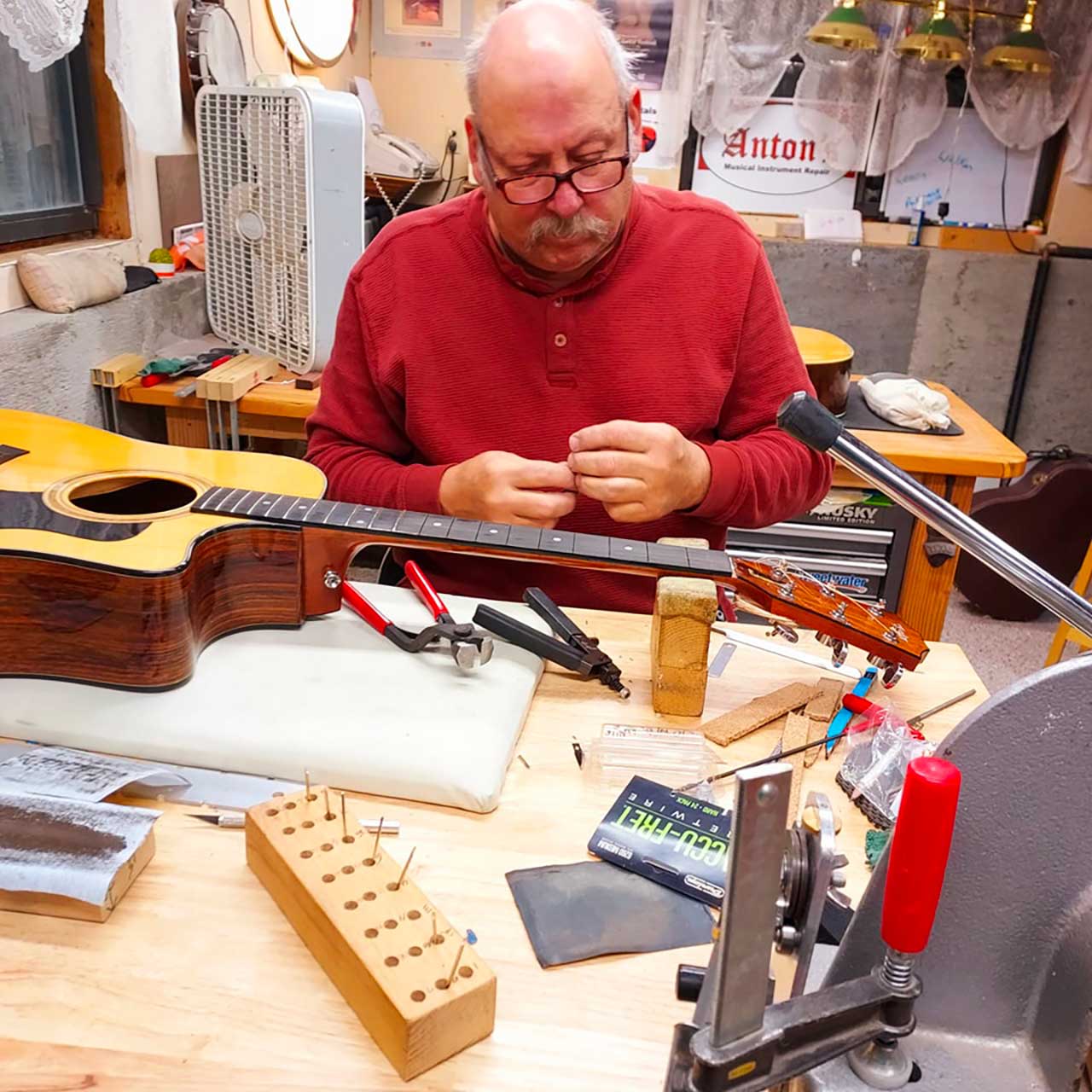
Which traditional luthiers inspire you the most and why?
Frank Ford, because Frank started not knowing anything, and as he learned he’d look back and see, “Wow, we didn’t know what we were doing then, and now we’ve learned”.
But he was never sanctimonious about what he had done in the past. Frank said, “Oh, we did things when we first started fixing things, that today people would look down on.”
Not realizing, “Wow, we shouldn’t have refretted that guitar that way and changing it when they refretted it.”
But learned, “Oh, this is how we should have done it”.
And the way that he learned to approached repairs, to keep things as original as possible.
I was also influenced by Charlie Derrington who fixed Bill Monroe’s mandolin. He was a big inspiration to me when I met him as a beginning mandolin maker. Listening to him talk to his customers about instrument repairs made me want to learn more about the repair field and is why I do repairs today.
I was also influenced by a local builder, Ted Berringer.
Ted was a builder but had his own ideas of what he wanted to do. I visited with him at his home and workshop and we discussed lutherie often. Although I had the highest esteem for him, once at a dinner party a musician asked Ted about an instrument adjustment he needed.
Ted turned and pointed at me and said, “You need to ask him. I build them; he fixes them.”
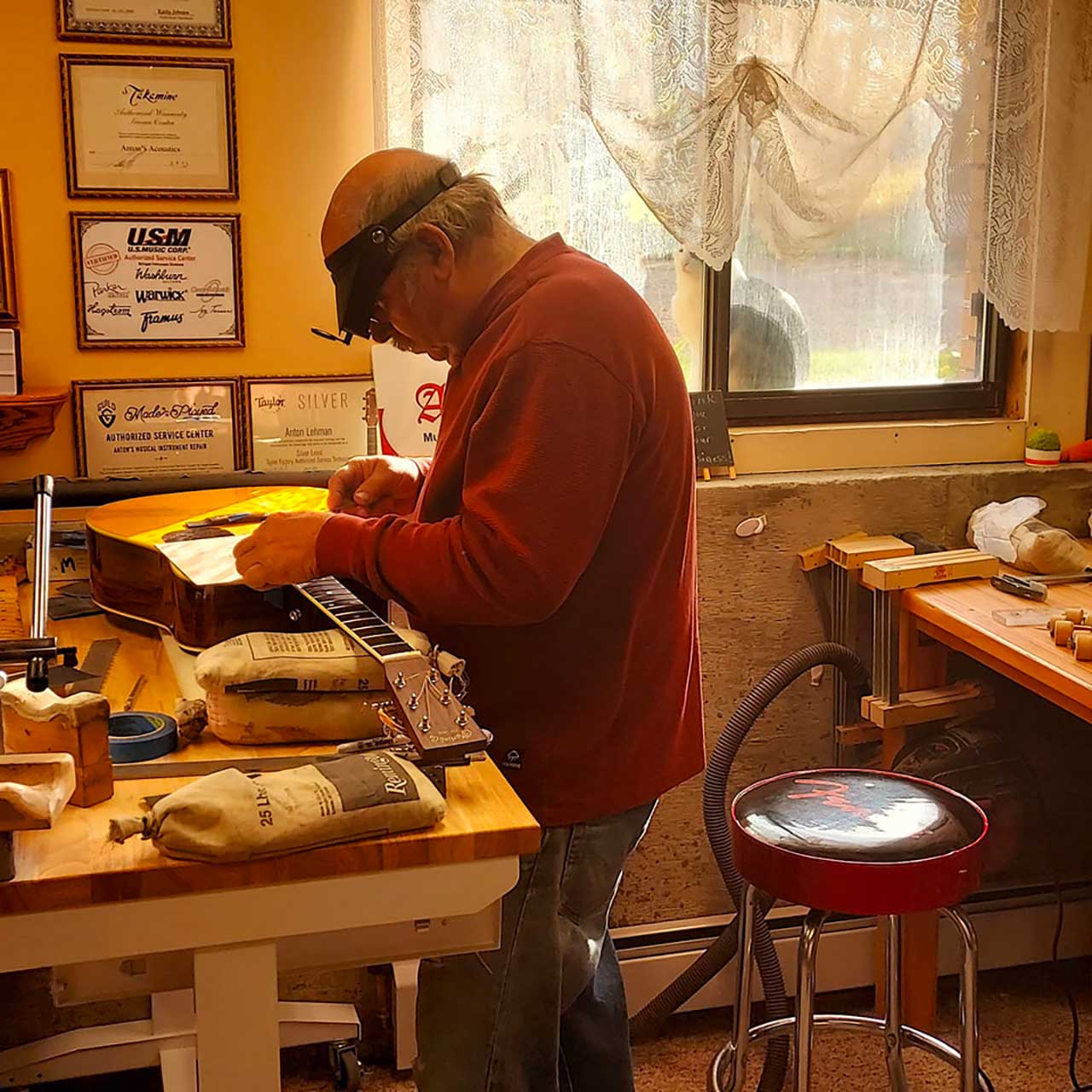
What do you think are the greatest progresses made since the making of these ancestral instruments (technique, aesthetics, etc.)? What have we neglected over time that you think is missing in today’s lutherie?
With the precise tolerances of the day, we are able to reproduce fine instruments with repeatability and with very consistent outcome with less expense. And I do not think that using modern woodworking to accomplish instrument making is a bad thing.
The CNC machine instrument is better because of its precision in reproduction and repetitive processes.
Matter of fact, if you’re going to make twenty guitars; the more the automation in manufacturing process, the more the product consistency. It allows us to be able to replicate instruments so that we don’t just make one great sounding one; but we might make a hundred, over the course of a few years. So having all of this equipment you’re able to do everything exactly the same.
If you know that the first guitar sounds great and you make everything exactly the same, then they all probably will have that great sound.
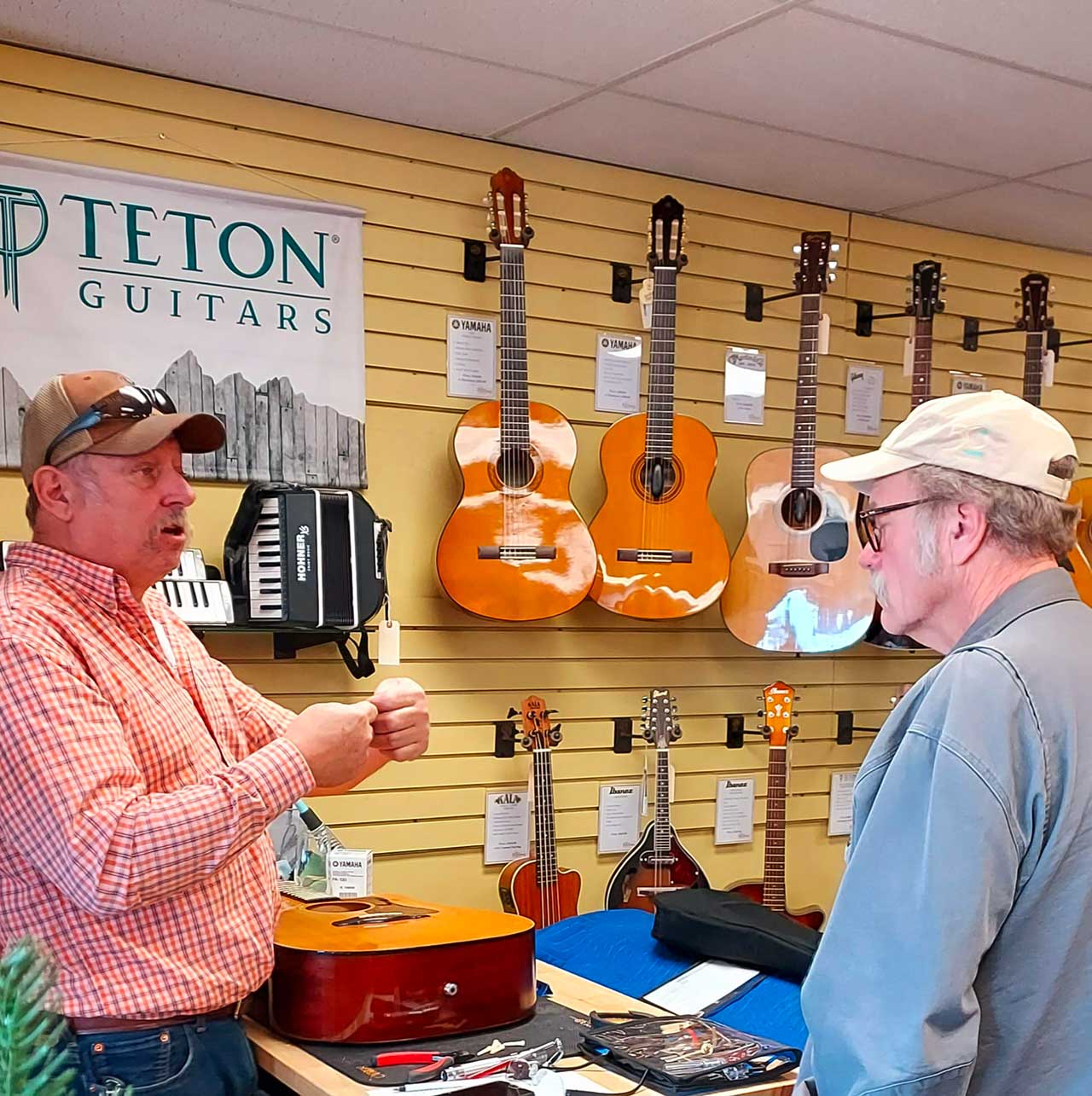
Are there materials and tools that are impossible to find nowadays, that had to be replaced and if so which ones?
Even some books of our field are becoming scarce. Traditional woods and tools that once used to be available are no longer easy to obtain. I use Cant Saw Files that are used to sharpen hand saws, but nobody sharpens handsaws nowadays. There is a whole generation with no idea of its use. Because nobody uses hand tools, you can’t get them; because they literally don’t make them anymore.
So, it’s very hard to find tools.
So, I might buy them up when I find them, two or three at a time.
The supply of traditional guitar wood is definitely affected. With a “throwaway world”, everything is considered disposable instead of being repaired. With that mind thinking, it’s getting harder to get woods and tools because no one believes things will be fixed.
Recently I bought six skins for banjo heads. The salesman asked if I was being greedy.
I told him that with lack of availability I was securing repairs for the future.
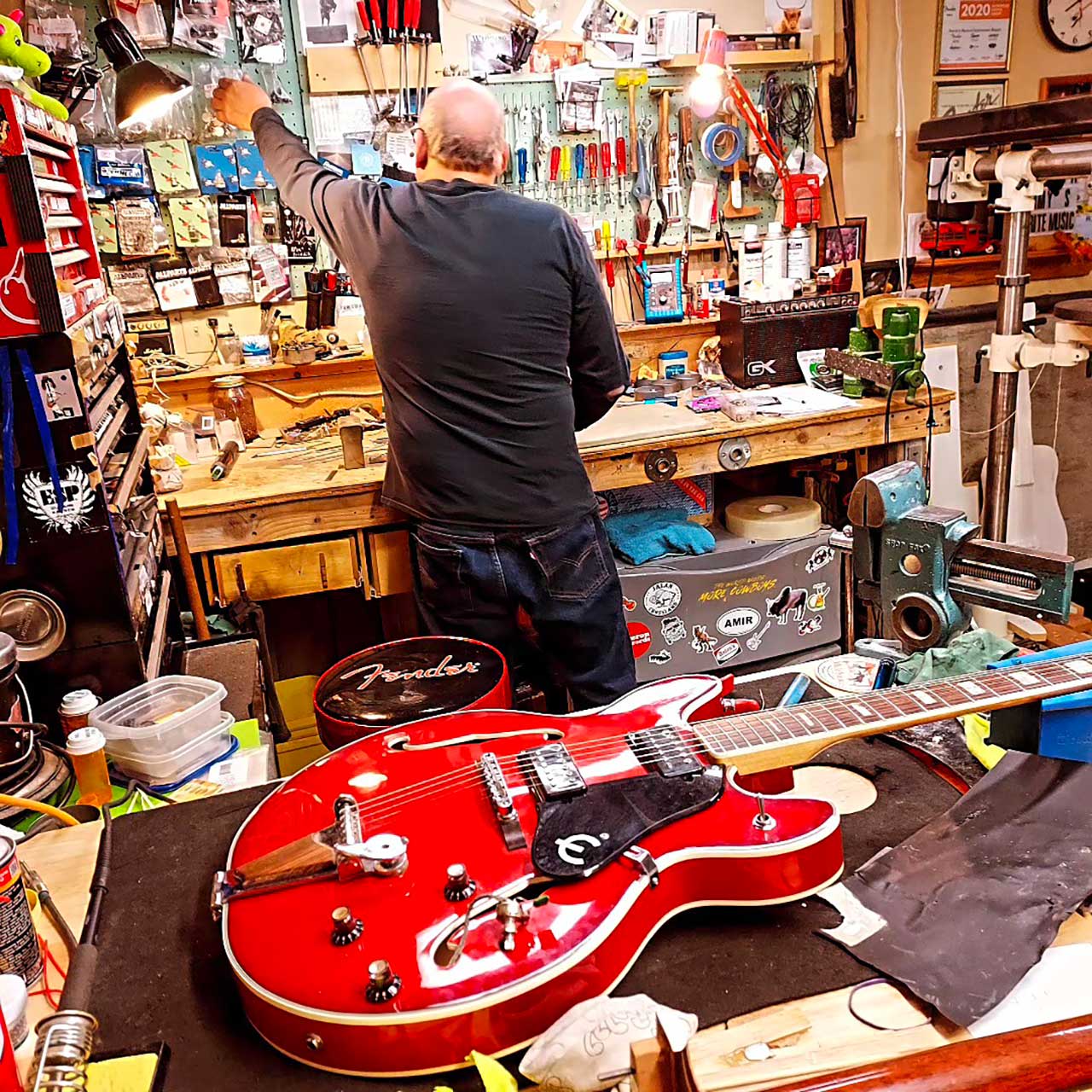
Is everything repairable or are there things that are impossible to recover when you take an instrument away?
What keeps something from being repaired is the person’s pocket book.
Pretty much anything can be fixed if they want to spend the money.
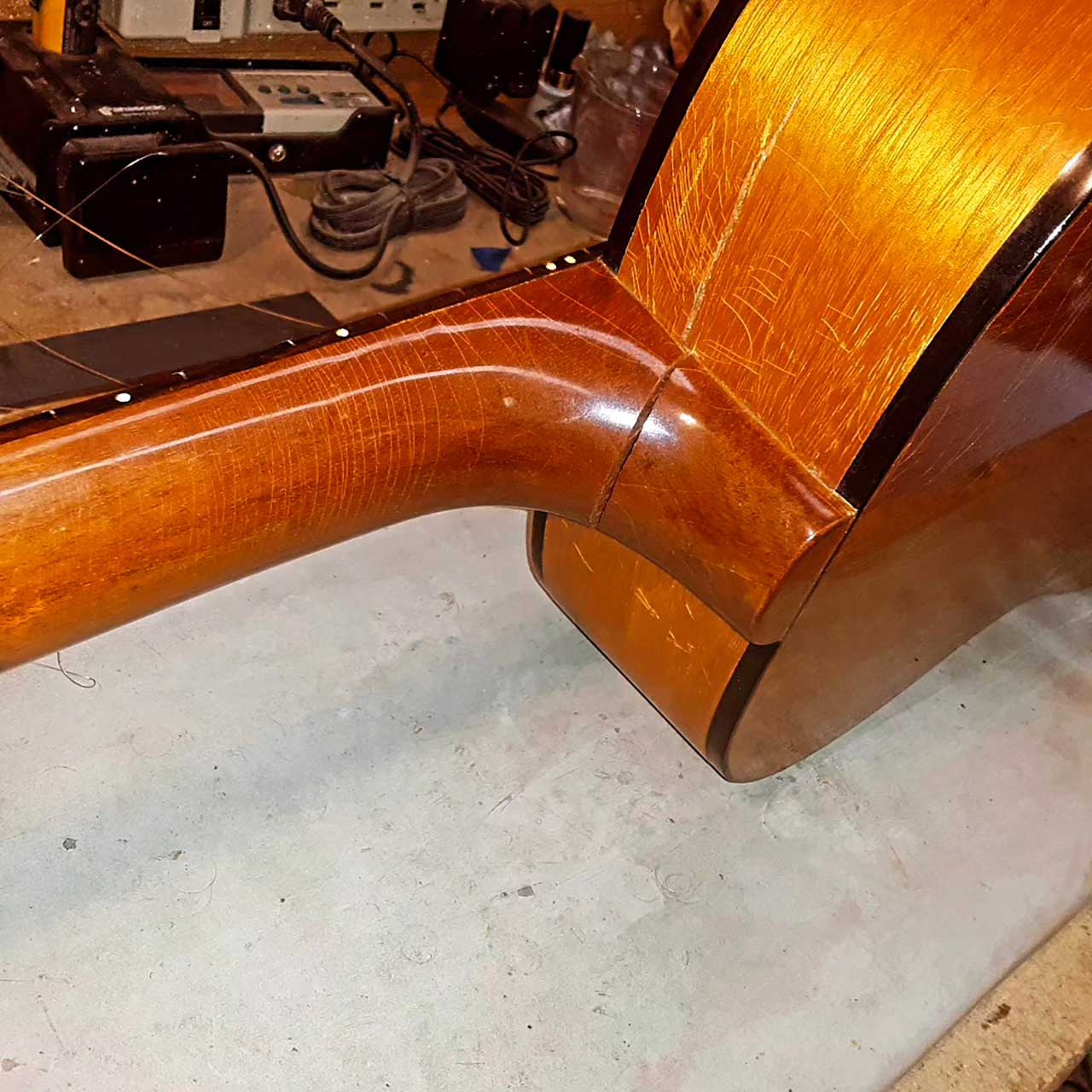
What is the oldest instrument you have ever repaired? Can you tell us an anecdote about an incredible restoration you have done?
I repaired several instruments from the eighteen hundreds.
I’ve got an 1850 mandolin hanging on the wall partially restored. I worked on a bunch of period zithers and mandolins and a Renaissance lute. I also restored an 1898 Martin Guitar and a 1910 Vega Banjo; the list goes on.
I once had a celebrity who brought a 1930’s Martin guitar that his wife found in the local county dump. It was in its original case. It needed a lot of work and came in pieces and slivers of loose wood. The back was coming off and it needed a complete neck reset. It also had green paint spilled on it.
And when restored to its glory, it was a very nice instrument.
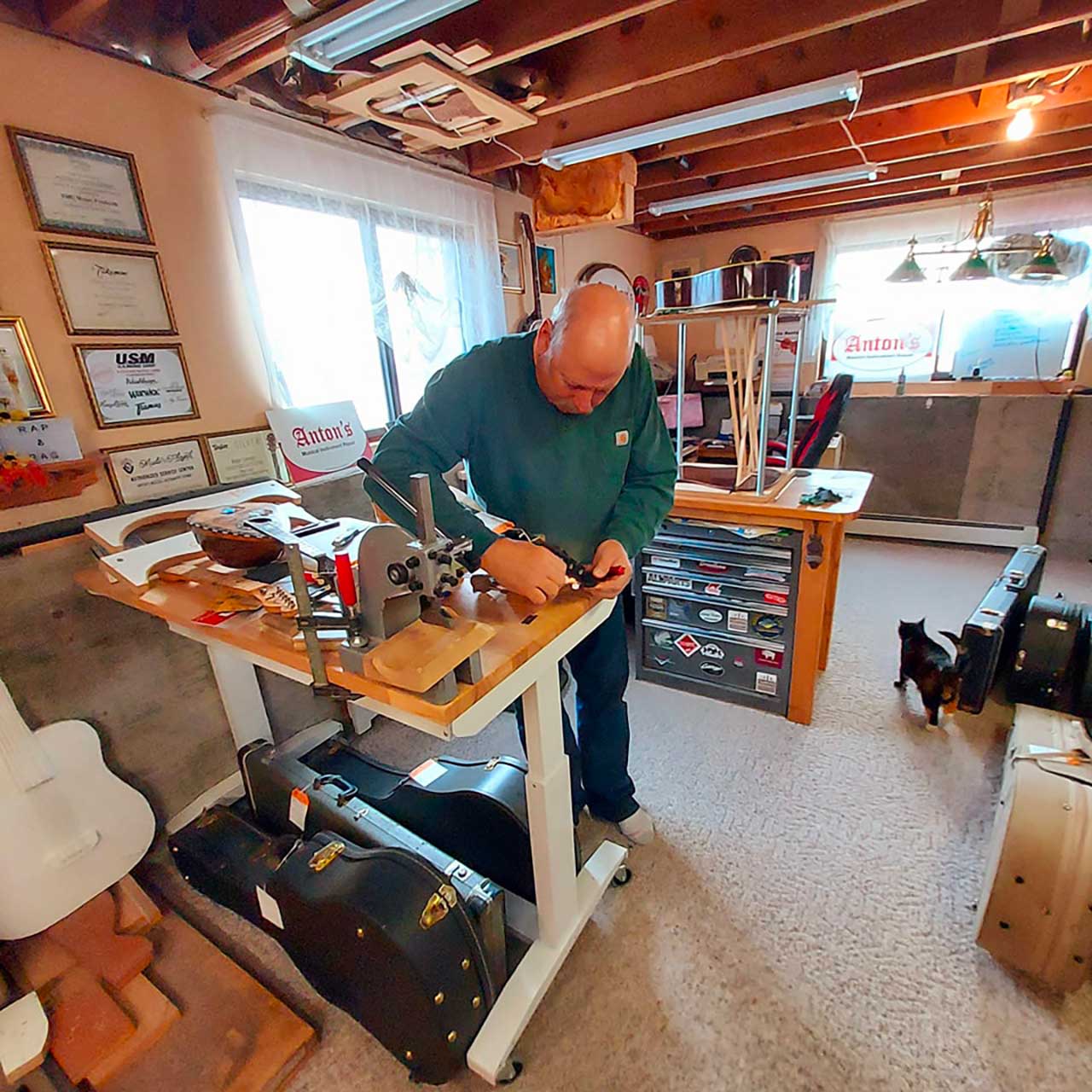
Computer has become everyone’s daily life, regardless of their profession. Do you use special computer tools in the field of Luthiers? Can you tell us about them?
Although it’s a necessary evil, I avoid the computer as much as possible.
I find the administrative side of being a luthier a great distraction from my string instrument maintenance and restoration business.
My wife is the social media expert and handles those inquiries and advertisement management.
We have a program called ACT (offline) for our customer data and have a program that we don’t admire for photography: Mylio.
I answer customer inquiries from our website and emails as needed.
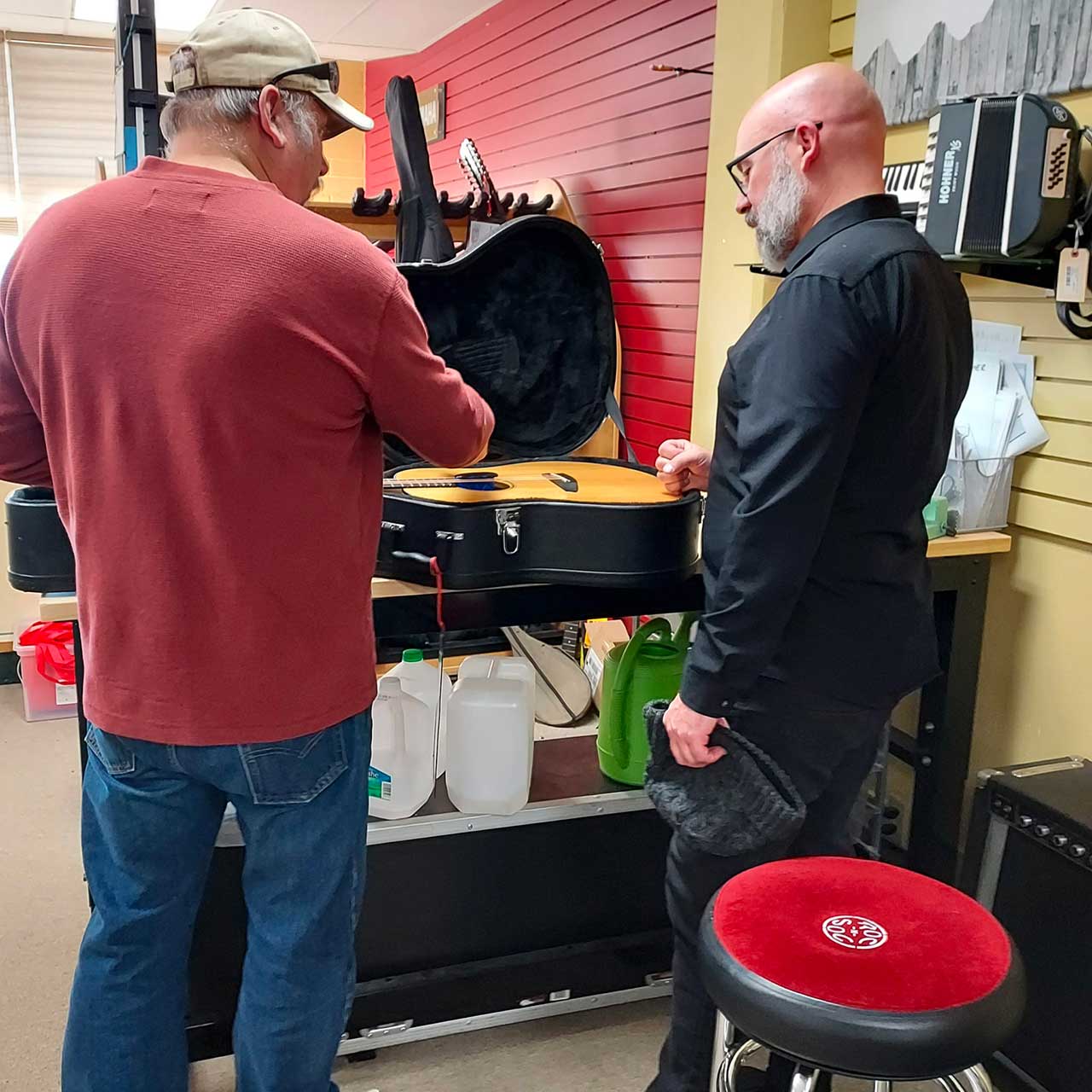
There is a huge selection of aftermarket parts. Do you work with regular suppliers or are you always on the lookout for new suppliers who can offer you something new? Do you have any examples to give us? When you can‘t find the parts you want at your aftermarket suppliers, do you ever create parts yourself or hire specialized craftsmen? Can you give us some examples?
As a luthier repairman, it’s getting harder and harder to find parts.
So, I am custom handmaking nuts, saddles, and bridges for my customers.
With all the unique instruments I repair you just can’t find a lot of the parts needed with any of the suppliers. They just don’t make the parts any more.
So, recently, I bought thirty pieces of bridge wood that I don’t need any time soon, from a company going out of business.
I know over the next ten years, I’m going to use those thirty pieces of wood, because I can’t buy the needed parts, especially in restoration for reproduction parts.
Just like some instrument bindings: I can’t replace the original binding, it doesn’t exist. The company that sold it is no longer in business. Hopefully, another supplier will sell it. I just don’t know who it is. It is getting harder and harder for us in the repair field anyway…
Because we’re in throwaway world.
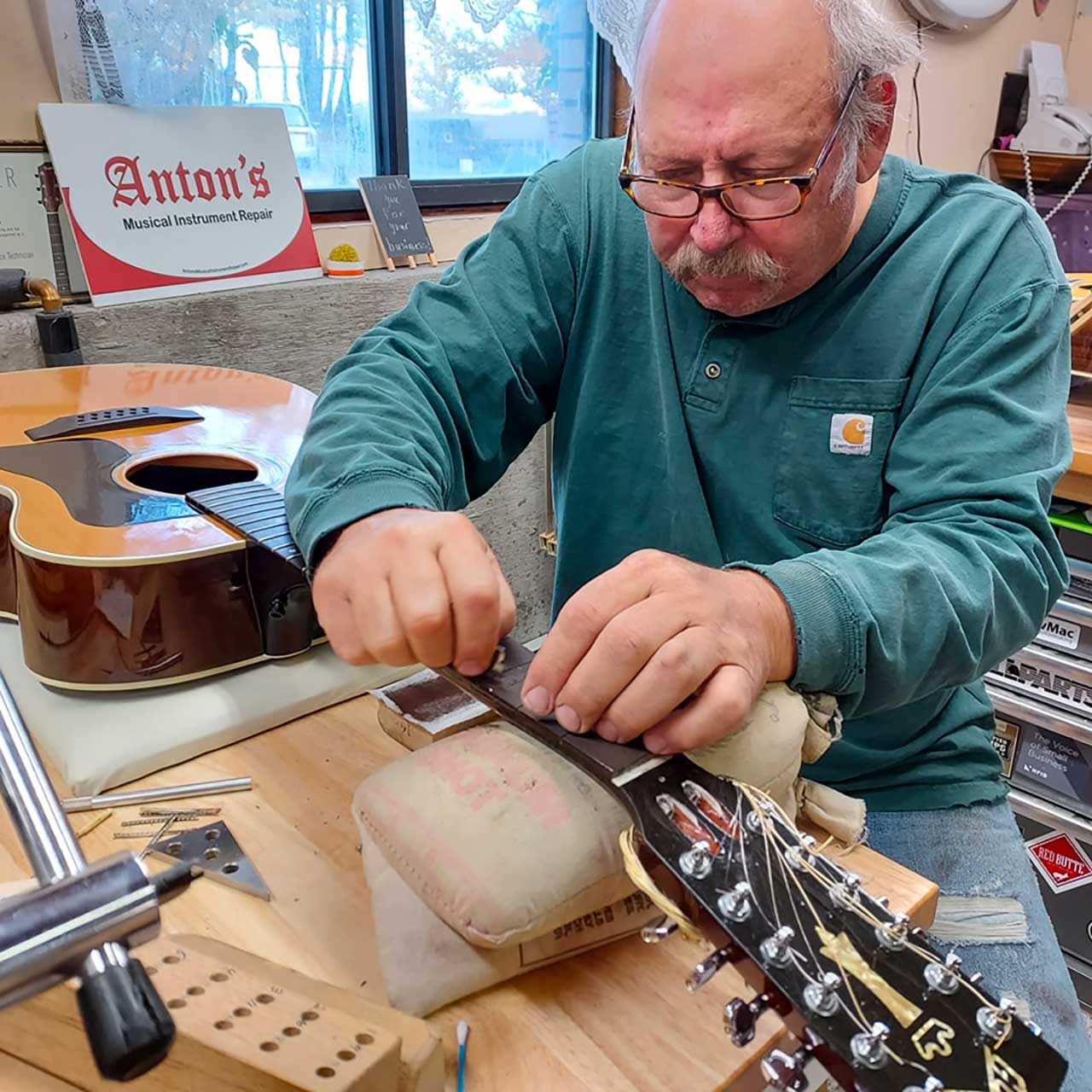
How do you choose the pickups for your electric instruments according ot he demands of your customers? Do you have any secrets or wiring habits? Have you ever had any very special requests, or requests that seemed strange to you from customers with special needs?
Though we help people with their pickup selection, we give them individual advice according to their preference.
One customer had an old archtop Harmony and wanted three Humbuckers and a seven-way switch. It took much engineering, but he was very pleased with the end result.
When someone inquires, we discuss playing style, are they in a band or solo, etc.
I attempt to help them get the pickup that will fulfill their needs.
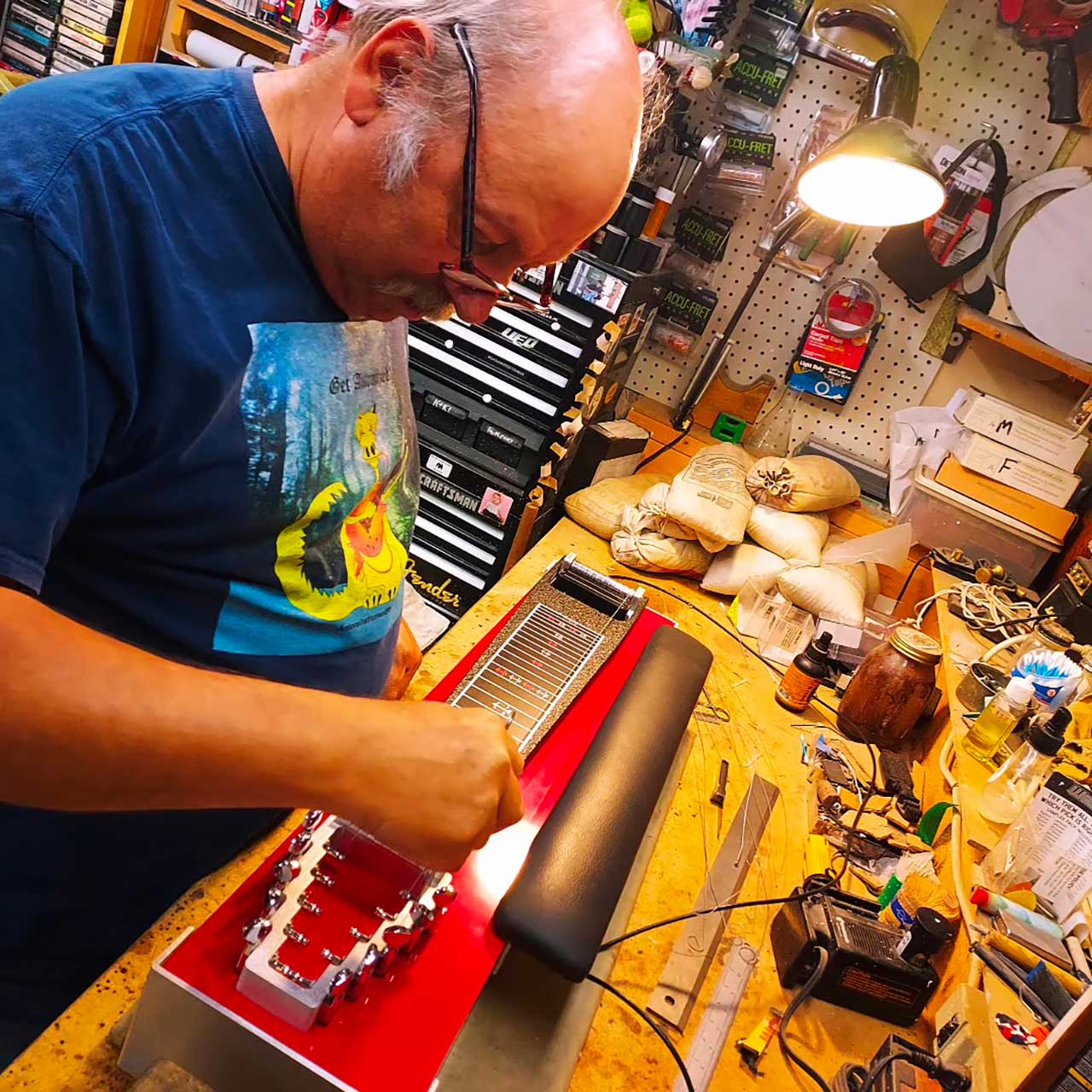
Varnish… Nitrocellulo, P.U (polyurethane) or French polish? What are your choices and why?
As a repairman, I have preferences obviously, according to its repairability.
Varnish can be repaired pretty well, but the new modern catalyst lacquers and epoxies and polyurethanes are much harder to repair.
So really on a new instrument or a complete restoration, I would use nitrocellulose.
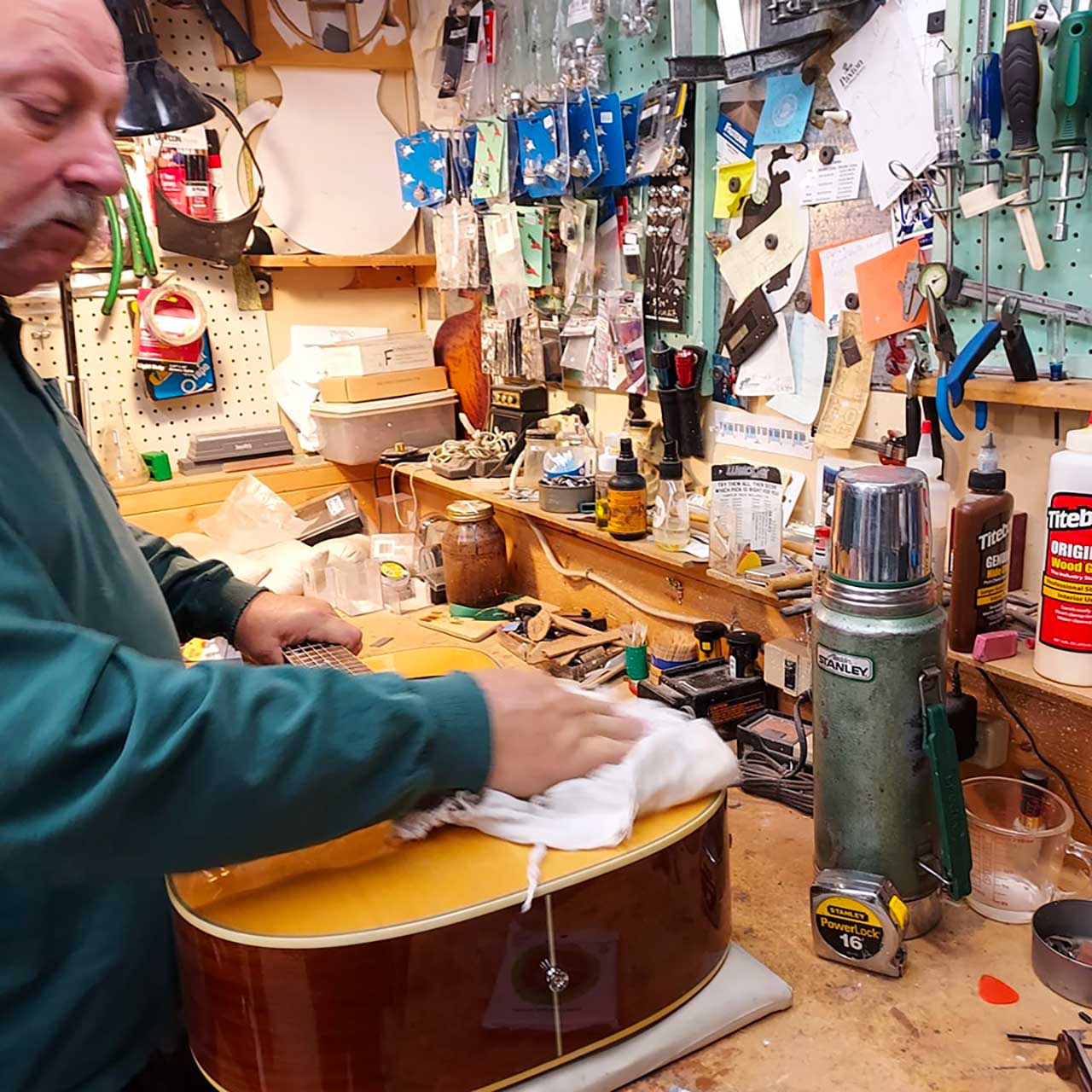
How do you help your customers choose their electro-acoustic sensors?
I spend time getting to know them and their expectations.
I give a consultation, since everyone has different preferences and play different genres of music and in different combinations of instruments.
The selection of a pickup for your guitar has to do with your style, and whether you’re a solo artist or a playing in a band.
Do they want just to get louder or do they want their instrument to sound the best in its truest form?
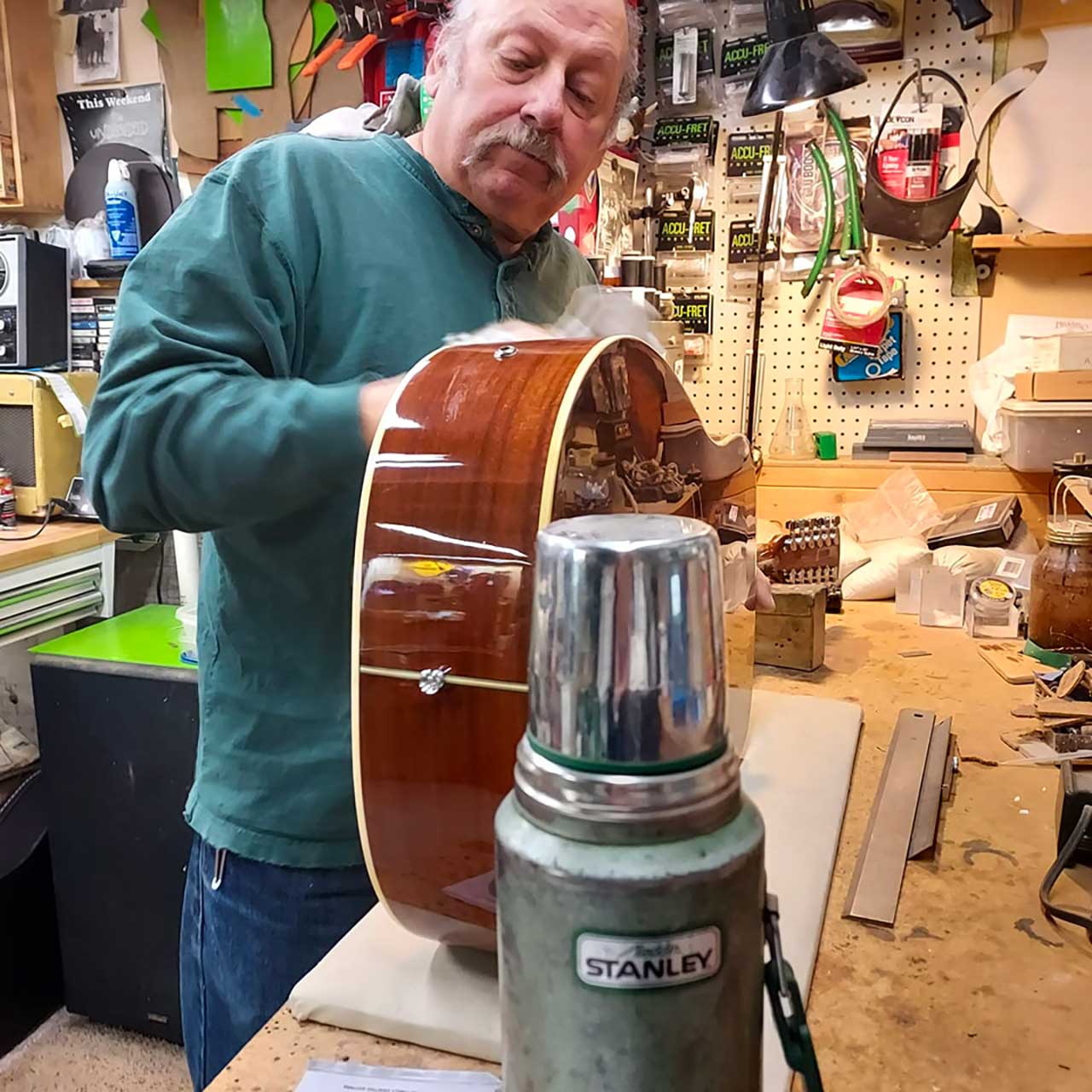
Anton’s Musical Instrument Repair Interview
Are you also interested in making amps and effects? And, if not, are you going to go in that direction like many other luthiers? Or do you prefer to leave this part to others? (If you know the names of friends who are in this field, can you name some of them? 😉)
Not interested in this field. 😊
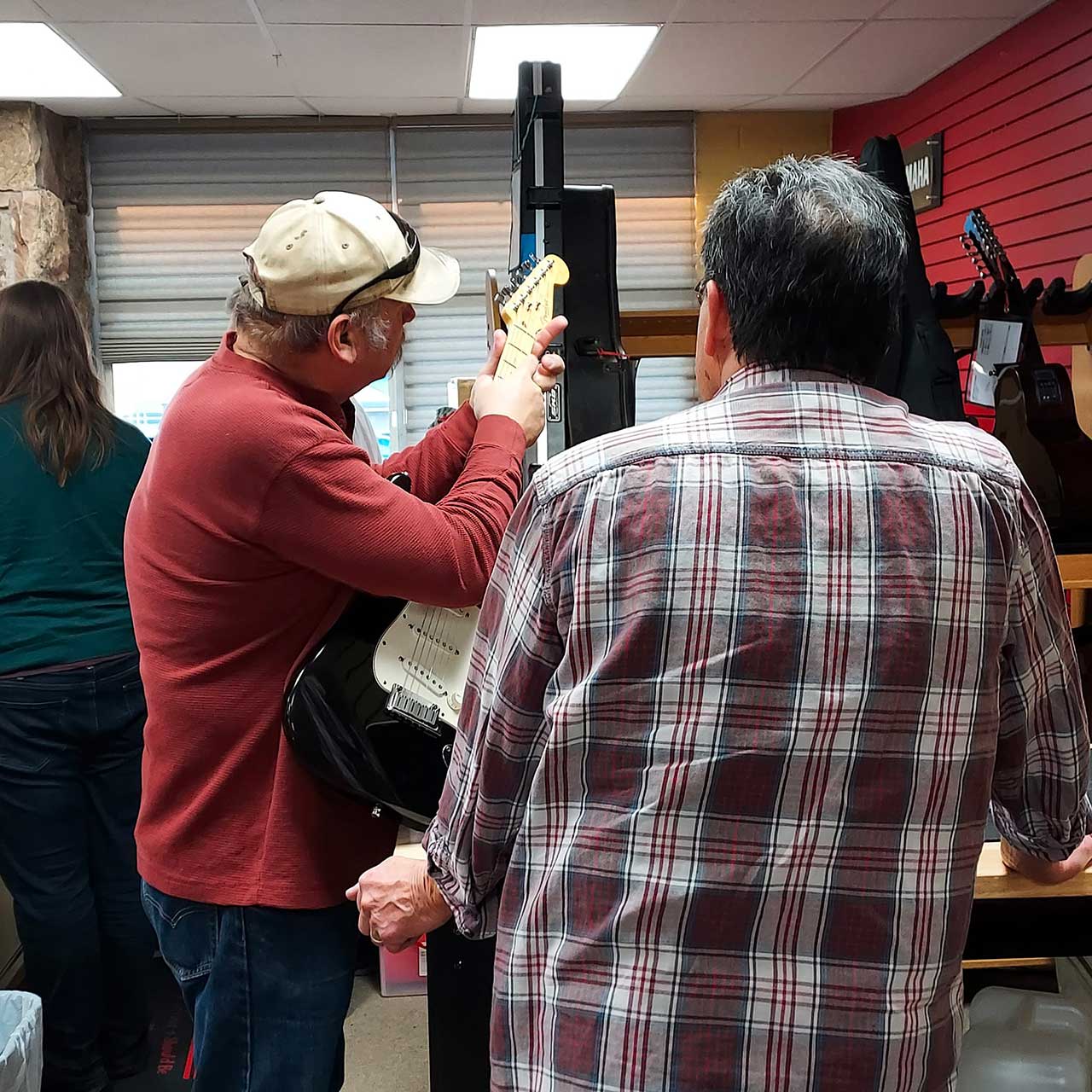
Do you have any advice for future young luthiers? Can you give them advice on training courses? Do you know of any special schools?
You can take a training course in a school, or work with a luthier building an instrument and are spending time with them to learn how to do this particular thing, or whether you actually apprentice with someone: The biggest thing you need to learn to do, is not think you know-it-all and pay attention to what they teach you.
Apprentices: be humble and learn patiently.
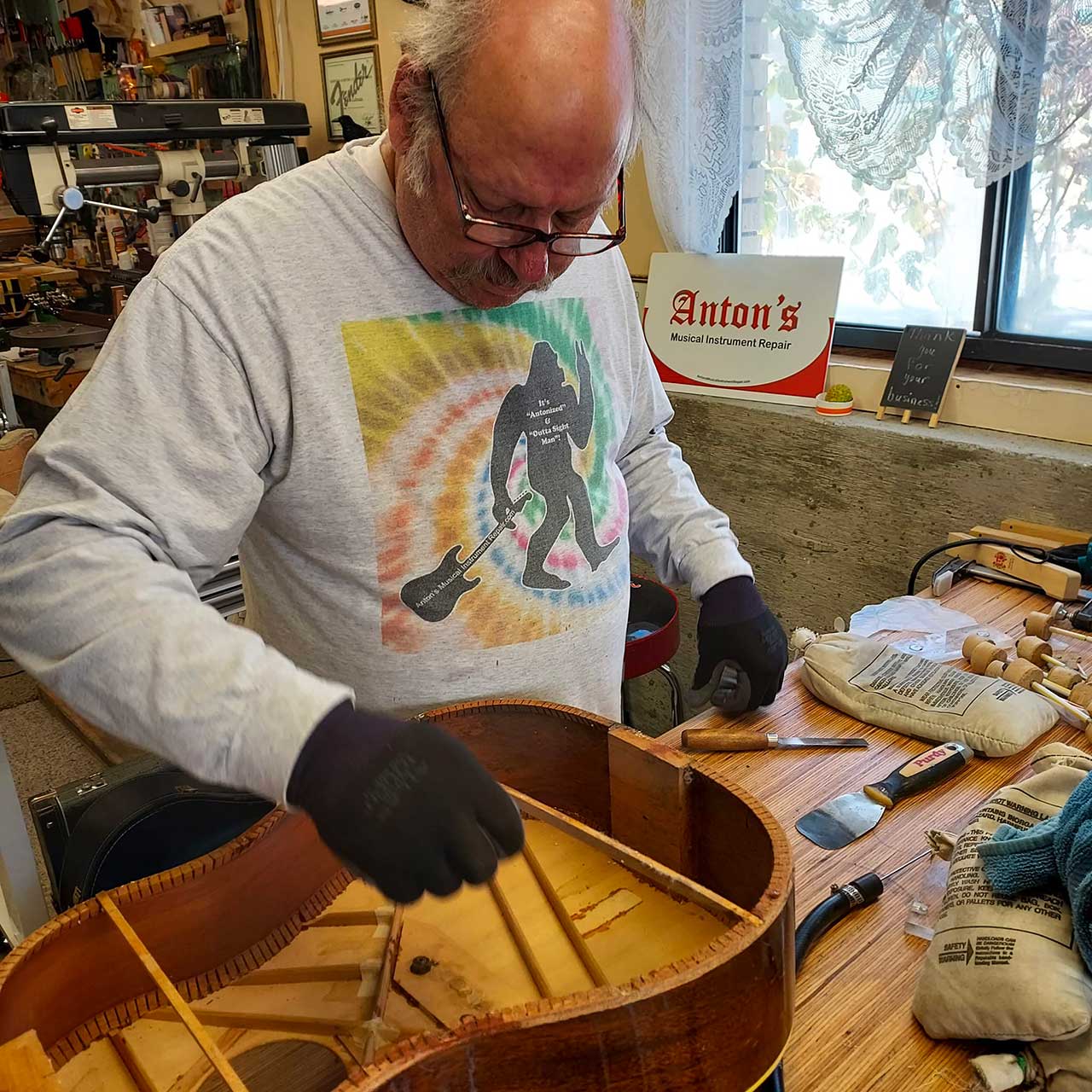
Anton’s Musical Instrument Repair Interview
The profession of Luthier is a trade that requires a significant material investment to start its activity. What would you advise a young luthier to buy to start? The minimum required? And, the maximum to be in a comfortable working environment?
In this modern world, everyone thinks they have to have a lot of fancy tools to do their jobs.
I started with a flat file and glued a piece of wood to it to be able to do level and crowns.
I bought a triangle file and ground it so that I could crown my frets, which I still use both of them. Eventually, as I needed a tool, I went and bought it.
I didn’t buy a whole lot of fancy tools just because of the fact that I was becoming a luthier. I bought them because I needed them; because I became busier and needed to be able to work faster.
An example is nut files.
My first nuts were cut with pippin files. As I became busier it was prudent to buy nut files to be able to speed up the process. In fact, I didn’t buy every one at once but bought a couple, next nut bought a couple more and so on.
Also, many tools that I purchased were not even close to advertised and either I modified them to work better or complained that I wasted money on junk.
Purchasing specialized tools eventually was easier because it saved my precious productive shop time, but not out of necessity to do the job.
As mentioned before, when I glued a block of wood to a flat file; now when I need a new fret file, I just buy it. It saves time over buying a file and gluing a handle to it. But we can build a guitar with horseshoe and wagon tools! I actually had a customer that did that and built a really nice guitar.
You could go to the bank and borrow $5,000 for luthier tools. How do you know what to get until you learn a little?
I bought things as I needed them or made things as I needed them.
I do think there is value in luthier books and notes passed down. Everyone wants to go online, watch a video, and call themselves an expert. That is not how knowledge is passed down.
Historically, students would watch a master luthier, study, and read notes passed from luthier-to-luthier apprentice.
I have a fine collection of luthier books that I have learned from and still use as reference.
Truth is, you can work with the bare minimum of tools and work space, when you understand what you are doing.
Gaining knowledge of what you’re doing is more valuable than obtaining fancy tools.
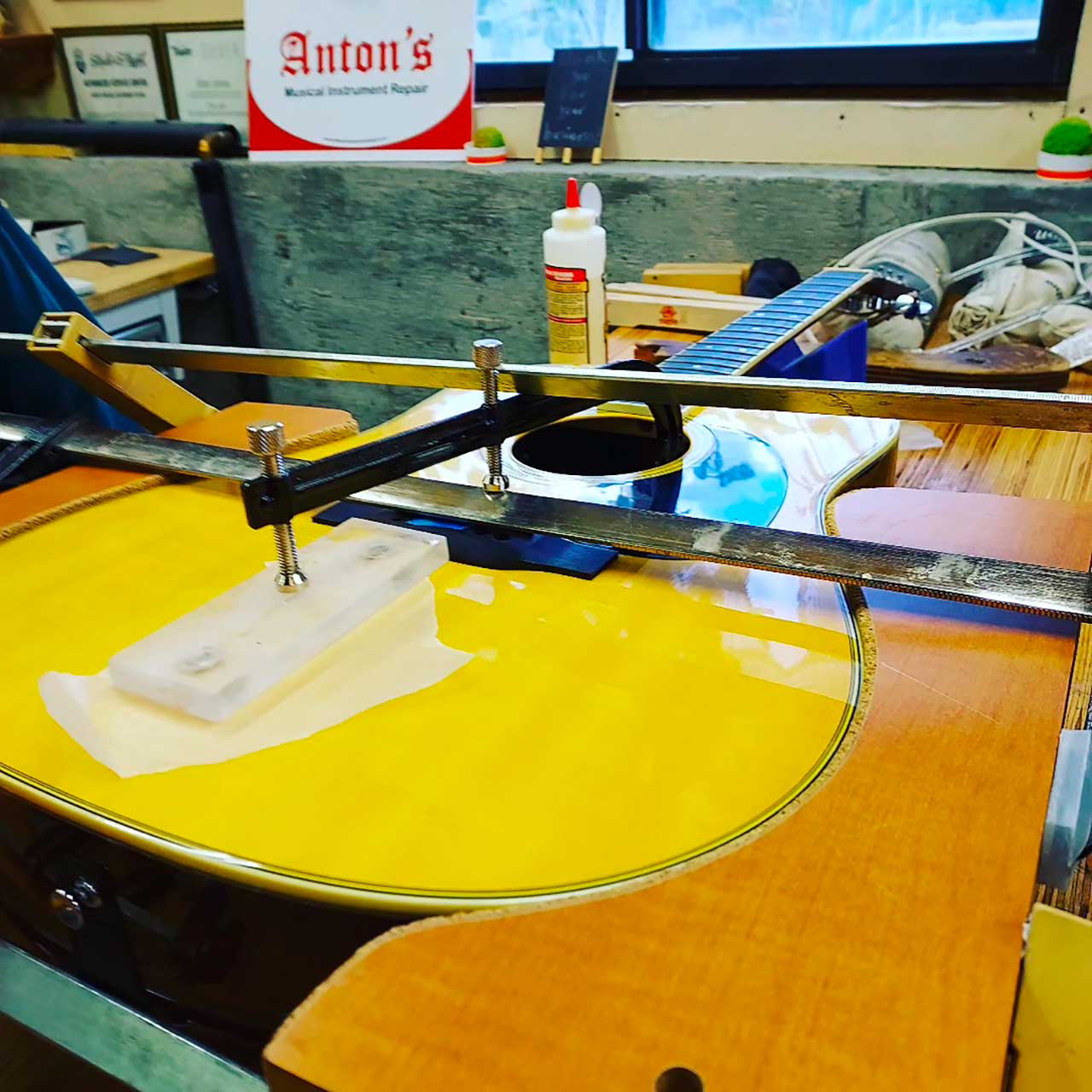
You can contact Anton’s Musical Instrument Repair
using the contact form on his personal page on Luthiers.com here :
https://luthiers.com/listing/antons-musical-instrument-repair/
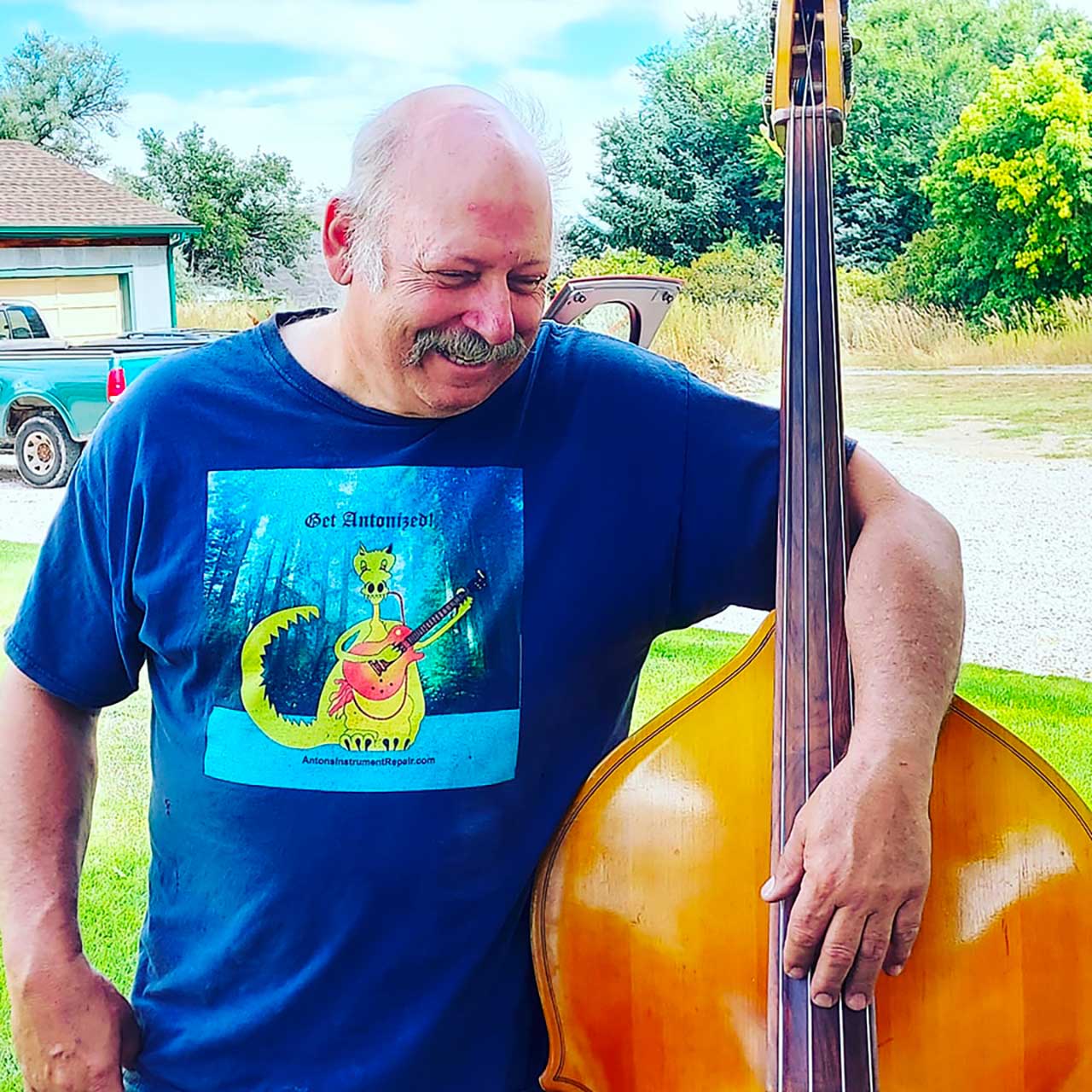
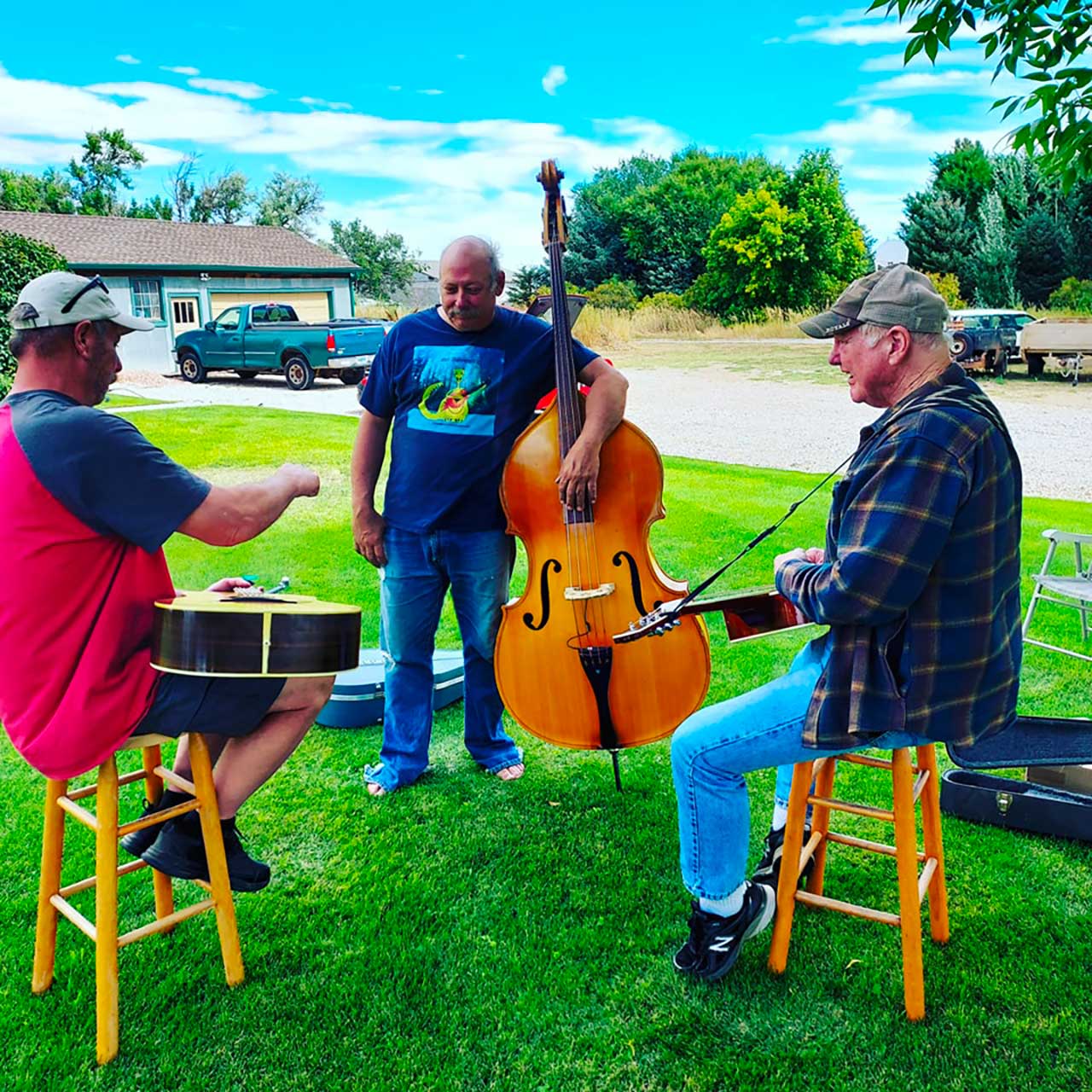
Anton’s Musical Instrument Repair
On Facebook: https://www.facebook.com/AntonsRepair
On Instagram: https://www.instagram.com/antons_string_instr_repair/
On Twitter: https://twitter.com/AntonRepair
On Linkedin: https://www.linkedin.com/in/anton-lehman-60a1154b/
Anton’s Musical Instrument Repair Interview
In the coming weeks, as for others luthiers for plucked string instruments, luthiers for bowed string instruments, amps & effects makers, wood & supplies dealers, lutherie events, jobs, schools & teachers subscribers on our site, you will be able to follow our series of mini-interviews dedicated to the fascinating world of luthiers.
See you soon…
#luthiers
Subscribe to the newsletter!
Subscribe to our newsletter to follow all our news and those of our luthiers.
If you are passionate about the world of luthiers, join us!